#rosby and stokeworth
Note
You’re a whole coon, of course Rhaenyra hates women, especially Black women, she tried to murder a 16 years-old Black girl, slut shamed her, called her racial slurs, and linked Nettles “ugliness/attractiveness” to her Blackness. Rhaenyra literally acted like a pathetic pick me in regard to Daemon and Nettles. If given the chance, Rhaenyra would have enslaved her. TB must truly despise Daenerys to compare her to Rhaenyra, they couldn’t be more different. (The way Rhaenyra is never mentioned in Dany’s chapters and GRRM has never discussed them in conjunction with the other, finally y’all can thanks HOTD for turning her into a progressive and flawless Mary Sue).
And really an insanely privileged white woman dying after putting a bounty on a lowborn Black’s girl head should be a good thing right ? We just gon have to celebrate Rhaenyra death with Nettles.
If you say so, anon, I guess I'm a straight up coon. 🤷🏿♀️
I suppose arguing how no one can be a feminist in a medieval world is coonish. I guess that pointing out how unconstructive it is to go "she wasn't a feminist so we shouldn't care about any possible effect her coming into power like the men before and after her have been able to will have an effect on other noble women's power to maybe implement some pro-women stuff in their own domains" to us analyzing why/how Rhaenyra is important to the history of Westeros and Daenerys is coonish.
I guess it's coonish of me to flout so many non-Nettles arguments of Rhaenyra's supposed bad leadership and amorality not once, but TWICE (that I remember), where it clearly just veers into straight up sexism: HERE and HERE....thus coming into why I even bother defending Rhaenyra (in some points).
It's not like I haven't already wrote several time in several posts how Rhaenyra's trying to get Nettles' head reveals much about the Targ-Andal paradigm she grows up in and tries to use to bolster herself through her going after Nettles to the end. It's not like I don't see how essentially different Daenerys and Rhaenyra are as people through the Nettles event as well as how they grow up and come into their positions of power and how/why they desire those roles:
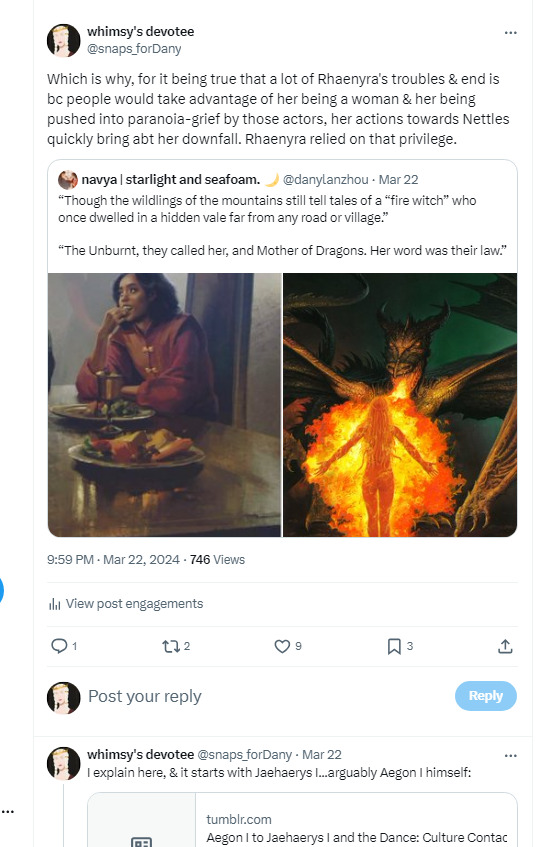
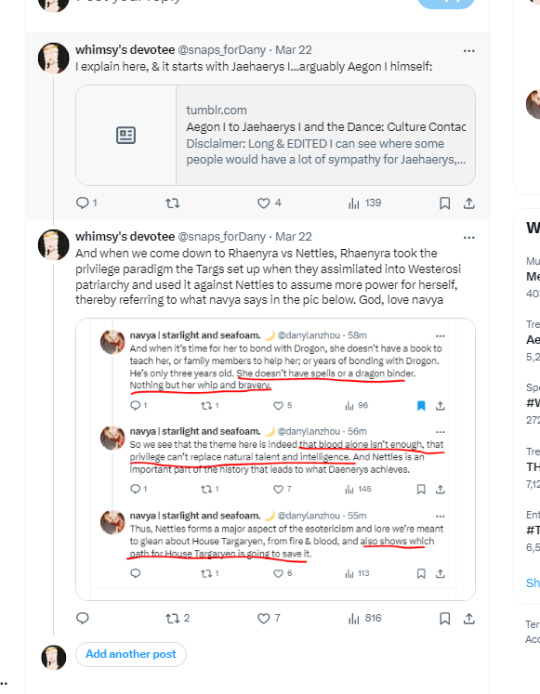
It's not like I haven't already written about the Black Jezebel stereotype at least three times, including on Twitter and here. It's not like I have defended Nettles not just from "dettles" stans but also from people who call themselves Rhaenyra stans while bashing on Nettles and Mysaria, totally misunderstanding both characters and what even a supporting character is.
But sure, I'm a coon bc I don't want to ignore the journey of Rhaenyra's downfall and make distinct where she decided to destroy another woman vs her being the victim. Sure, I'm a whole coon.
And for the last fucking time, "compare" does not always or only mean "these two things are exactly alike and I will show you how"! "Comparison" analyses means that you will list out what traits or developments two things have, what inspirations, and see how they differ and how they don't. And through such a process, you will find out how many and how well/or not these two or more things are alike and how.
For Dany and Rhaenyra, I never said these girls/women were the same person. I said that both women, as women in male-designated positions of power, have to deal with people in world AND out of world must contend with misogynist feelings towards of their not deserving power or leadership on account of their gender, no matter what sort of characterization either had BECAUSE even with the main series not being like F&B, not being a history book, PEOPLE IN THE FANDOM STILL TEND TO MISREAD OR TWIST DANY'S ACTIONS AGAINST HER CHARACTER AND GRRM'S INTENT. Rhaenyra is meant to contextualize that very experience into a real event of catastrophe, she was set against ever since she was 10 bc she was female and another, older woman wanted power denied to her directly bc she was a woman. This is a fact, you nor I can change that. There is a difference between what we learn from the events to make the conclusions of who should rule ideally and what we should shoot for VERSUS thinking of the situation at hand for what it would have been like for the character.
F&B (having been written after the main series) continues even this "analysis" phenomenon; what do people choose to believe when it's a woman at the center of their stories?! No matter her real circumstances or their knowledge of things not present in their understanding of the world and of history?
I also mention, several times, how it is here, Rhaenyra's end, where the Targs lose their dragons because they have assimilated into the intenser patriarchal paradigm already mentioned to the point where they weakened their women's positions by denying them their autonomy and political powers...which plot sequence wise leads to the end of the dynasty as whole and Dany's exile. I'm must be a coon to not want Nettles, a 17 year old, to fuck a 50 year old, esp with her being his bio daughter. No, anon, I am too repulsed with direct vertical incest (parent-child, grandparent-grandchild, etc.).
Then there is how the Bloodstone Emperor and the Amethyst Empress and how the former usurped tha latter and plunged the entire world into mythological "darkness"--thus leading up to the importance of the Azor Ahai, aka Dany, directly seems to reflect how another brother--Aegon II--usurped his older sister--Rhaenrya--and thus the world loses a strong magical tool against darkness "dragons". An obvious link....
In fact, I tend to repeat how different they are as people! There's this whole thread talking abt the very thing I despise abt some critiques of Rhaenyra. I even say many times that Rhaenyra couldn't have the throne after the Nettles letter, that at that point, there needed a "refresh". Up until then, there was simply more reason for us to not think her a real terror except for maybe Addam and Alyn. But I have my misgivings there and it comes down to timing and grief.
No, Rosby and Stokeworth do not count and why? I already wrote why, but for someone who doesn't stan Rhaenyra or is not a fan of hers but actually stans just Daenerys--the previous ozymalek says:
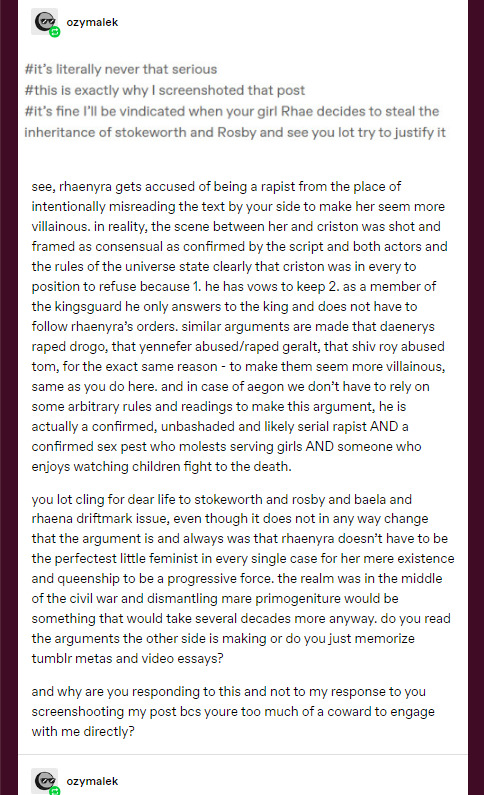
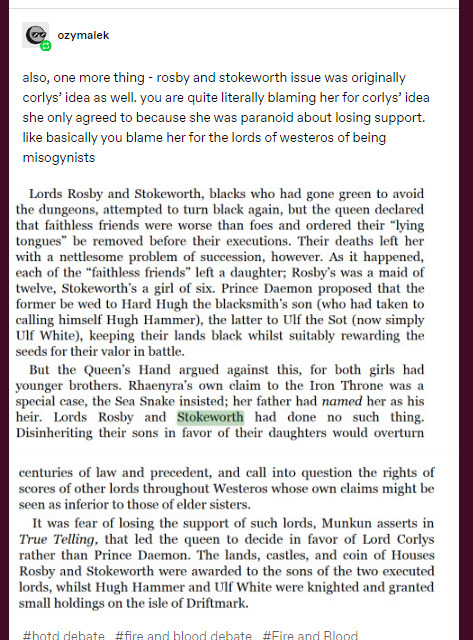
I have myself said several times how I disliked how they rewrote show1Rhaenyra to make her a much less assertive version of herself, and I agree with others how they made her female-friendless. No matter how amoral or moral she was, similarly to Dany, people have written her sexistly in the show. I believe that this is CENTRAL to the point of F&B, how people refuse to see the point of it.
Finally, I really don't see how the hell show!Rhaenyra even is a Mary Sue or a NLOG, bc for the first, she displays no skill she excels over others at. A Mary Sue is:
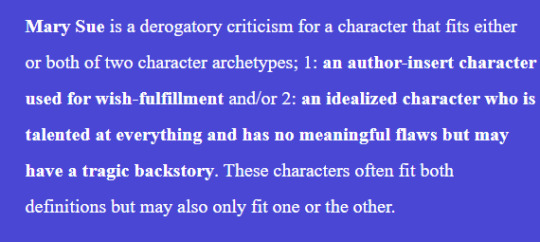
Show!Rhaenyra, for some reason, seems "perfect" to some people. Esp with Luke saying so in epi 8. I never felt that way, I always thought she (older, not younger) was too meek and that is her great flaw---due to the sexist writing, but if kept at face value, that's the great flaw. Other definition: Who is inserting themselves into her character on the show? you got proof?
A NLOG (not like the other girls) is a Cersei like character who goes out of their way to destroy/diminish most women who are competitors for their power or destroy any semblance of socially-defined femininity and socially-coded feminine "weakness" so as to appeal to the male authority and get privileges. Problem is that EVERY SINGLE FEMALE MONARCH AND WOMAN IN SOME SORT OF AUTHORITY OVER MEN IN EVERY SINGLE PATRIARCHAL SOCIETY had to convince their male supporters that they were the one they should follow to some degree more than any male heir or candidate--during a time where they had to either fight for their "birthright" or they were planning coups (Catherine the Great), came into power through some accident, or whatnot--that their rule was in it for them. There is no pattern of woman-hating or self-hating to define Rhaenyra as a NLOG, where she consistently tries. NLOGs tend to hate women even in their own "race" or group for perceived acts of upheaval and destabilizing their positions of power. Alicent was and she uses misogyny to do so, so Alicent is not Rhaenyra's victim; other way around. Rhaenyra has all reason to despise Alicent, justified even. It's more than the positions, it's the whole targeting since 10 deal and trying to espouse Rhaenyra's inherent unworthiness for power.
So Rhaenyra deciding to do the Rosby/Stokeworth bit is her seeing how her greatest ally, a sexist man, has basically all her ships during wartime and insisting she does not give those girls their father's seats is Rhaenyra choosing wrongly, yes, but something I don't think that you or a small number of women would bow under considering the other shit she was going through. Yes, even black/PoC women. Again, this is not about Nettles but about women vs women (yes with them all being white or white-adjacent) bc I know that this will be the next thing some will say as a counterargument to what I'm saying here.
You are correct, however, in how similar Rhaenyra's behavior abt Nettles is pick-me-ish and NLOG concerning her intent to turn Daemon back to her and how this was her seeing Nettles as competition for "control" over Daemon, who was one of her principal military commands as well as her romantic partner...and like i said once before, this is a reflection on how this Andal-Targ patriarchal paradigm makes its own female "terrors" through misogyny. To ignore the process is to endanger its justified repetition. Yeah, Rhaenyra ends up becoming like Alicent in that way after the consistent losses, and I mean defaulting back to destroying another woman for a simulation of power. This doesn't mean that she was a feminist or that she didn't intend on using the Black Jezebel reasoning to get rid of "competition" to feel more in control. It does mean that her behavior reveals her enmeshment in the xenophobic, aristocratic, patriarchal Targ-Andal feudalist paradigm that she chooses to use to, again, construct more feelings of power at a time where she seemed to feel she was losing more and more--after the betrayals and the deaths of her sons in that moment. And yet if there is anything to be extracted from her narrative it is how that built-in classism (the companion and parent of racism) can become the thing these women default onto to retrieve/gain the agency & power denied to them. I believe this is also where you can draw a core similarity to Cersei, who is rather the starkest extreme example of that classism making up for her internalized misogyny through her Lannister Exceptionalism.
The discourse has to include how we, the readers, over-blame Rhaenyra for things she has either very little control over or what she had no control over and for trying to, again, assert herself (before Nettles). She's a reflection of her times and situation; doesn't mean she isn't still a victim. You don't need to like her. I never asked for people to do so. I don't care if you do or not, I've never needed that. Just don't lie or twist information or ignore clear patterns GRRM establishes that are also important, or try to erase the lines of harm done to her and undo the work GRRM is doing to point out this pattern of misogyny that contextualizes one very key aspect of Dany's journey: sexism doesn't care how goo or classist you are, you are a woman so you will be subject to disenfranchsement, distorotion of facts, and destruction...if you are not like Dany, who intuitively and "rationally" discovers lanes of power while reintegrating her beign to the natural process and relationships between herself and her dragons for the ecological benefit of the entire world (the Others, again). Unlike Rhaenyra, Dany doesn't fall into the ideological "trap" or the noblewoman's save-grace of exploiting of lowborn people AND dragons but intelligently seeks other non-exploitative ways to use her dragons and those inspired by he bravery. This again, does not erase or override the sexism that ties these two together.
It's a paradox, not a contradiction.
#asoiaf asks to me#rhaenyra's characterization#rhaenyra targaryen#fandom nonsense#rosby and stokeworth#rhaenyra and feminism#hate asks#azor ahai
18 notes
·
View notes
Note
(Non book reader here) What's this about Rosby and Stokeworth?
oh this happens much later in the dance- basically, when given the choice to allow an eldest daughter to rule, rhaenyra passes the daughter over, two different times. in both cases (one more than the other), her decision is later directly implicated her downfall and death.
let's start with house stokeworth. lord stokeworth actually swore fealty to rhaenyra and was imprisoned in king's landing by the greens because of it. under duress, he swore for aegon. when rhaenyra took king's landing, lord stokeworth tried to renew his fealty to her, but she ordered him beheaded. he left behind two children: an eldest daughter, and a younger son. daemon suggested she choose the daughter; rhaenyra chose the son, even though he was super young and couldn't really rule.
basically the same thing happened with house robsy. lord rosby swore fealty to aegon to avoid execution, and when rhaenyra took king's landing she had him executed. again, lord rosby left behind an eldest daughter and a younger son. again, daemon advised rhaenyra pick the daughter, and rhaenyra chose the son instead.
as an aside- i don't think rhaenyra was politically pressured into one answer or another. these two decisions wouldn't have really set a precedent for any of her other leal lords, because they specifically involved lords who had committed treason in front of tons of witnesses. the precedent would have only granted rhaenyra the power to choose a lord's heir after he'd been executed for treason and wouldn't have applied to any of her then allies, so making a woman heir shouldn't have made any of her lords feel threatened.
here's where it gets interesting. later, rhaenyra has been rejected by the smallfolk and is fleeing the greens. when she asks the stokeworths for refuge, the male castellan (ruling in the young boy's stead) tells her she can only stay for one night, and then turns her out onto the streets. when she asks the rosbys for refuse, they straight up refuse to even let her enter- directly at the command of the woman whose claim rhaenyra disregarded. it is after being turned away by these houses that rhaenyra flees to dragonstone, where she runs right into aegon the elder's hands and meets her end.
now, it's not specified why rhaenyra chooses the son over the daughter. but this is grrm we're talking about, and the narrative importance of lord rosby's daughter in particular is relevant. it's deliberate that the dismissal of the daughter's claim is mentioned in the same sentence where she denies rhaenyra entry. the poetic justice of that is not a coincidence. whether you think this is grrm narratively punishing rhaenyra for not being feminist enough, or whether you think she's being unfairly punished for being constrained by the patriarchy- it's up to you. i'm personally undecided. but regardless of her intent, her decision is very intentionally implicated in her demise.
#ask#asks#answered#hotd#house of the dragon#fire and blood#fab#house rosby#house stokeworth#rhaenyra targaryen#rhaenyra
47 notes
·
View notes
Note
Is it Rhaenyra's fault that women are not allowed to rule?
well i can try to be as measured as possible here: No. Absolutely not. westerosi society is... yknow... a hyperpatriarchal feudal monarchy, it was that way long before the conquest and it still is long after rhaenyra's death. whatever might be speculated about valyrian gender roles differing from westerosi ones, aegon still makes himself king instead of visenya, even though she's older (also, yknow, not gonna give the slave society props for being progressive). rhaenys' inheritance (through laenor) is passed over by a huge margin by the great council (jaehaerys himself having no faith in female inheritance rights, considering he felt the need to call the great council over it in the first place). there are very few scenarios where i can imagine westeros was ever going to be conducive towards a ruling queen.
patriarchy isn't the "fault" of "bad examples" of women in power. not to mention the history we see in f&b is, yknow, fairly unreliable. it seems fairly clear cut that her government made some extremely bad ruling decisions— treatment of smallfolk leading to the dragonpit, etc— and in this case it feels prudent to mention her disinheritance of the rosby/stokeworth female heirs in favour of their younger male relatives. that's a huge problem for rhaenyra considering her rule relies on female inheritance! however, she also... was subject to overrule by an otherwise male council, and subject to the conditional support of mostly male lords. asoiaf has always complicated the idea that monarchy is solely the will of the ruler and not subject to external pressures. tbh, it complicates the ideas of "agency" and "fault" in general— characters are defined and caged by a society with deeply entrenched ideals and roles. i think she's a tragic character; wanting so badly to do what's right, believing very sincerely that her rule is just. but the series is very clear that no matter our best intentions these systems of power are poisonous! what rule is ever just? any justification for war falls apart at the horror of its human cost!
was she a totally good queen making perfect astute political decisions, slandered by the histories? i don't really think so. was her rule ever meaningfully trying to institute feminist policies? No. do i think that, post-dance, people may have used rhaenyra's alleged misrule as justification for passing over female inheritance? yeah, sure, probably. but that would never be the sole justification. this is a systemic issue and not a personal one! One Perfect Woman is not going to topple patriarchy overnight!
#and rhaenyra is certainlynot perfect. bc shes a human being lol.#asoiaf#hotd#long post . i guess#idk i think theres a lot of nuance here! lol#it's very very funny how icefire posting can be so fucking inscrutable. literally talking about fake history this way. its funny#ohhh the rosby stokeworth debacle? yes of course we all know the rosby stokeworth debacle.#trying to make an asoiaf post without using the word Systemic challenge. failed
97 notes
·
View notes
Note
TBH I'm a little uncomfortable with the implication that Olyvar R. had sex with Lollys, but I'm going to hope that she had the mental wherewithal to consent.
Lollys Stokeworth is intellectually disabled, but she’s canonically quite capable of expressing opinions and of coherent speech. Her level of capacity is somewhat vague, and she was probably a bit frightened of being forced to wed, but then, Olyvar R didn’t get a choice in the marriage either. Lollys is his wife, consummation is expected, and so it happened. Neither of them were thrilled, or traumatized.
If it makes you feel better, my head canon is that they only have sex for procreation, and Olyvar R has a discreet mistress to take care of his needs otherwise.
11 notes
·
View notes
Text

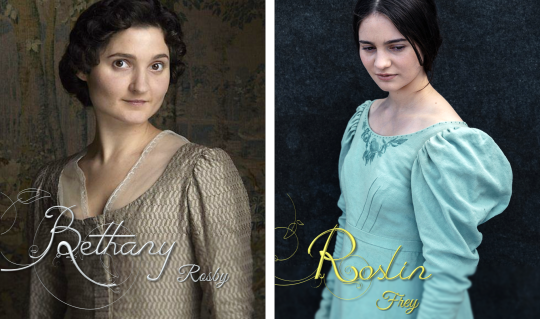
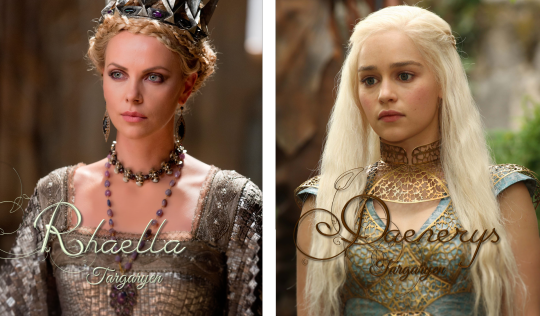


mothers and daughters (part 2)
Deborah Ann Woll as Falena Stokeworth // Marley Shelton as Jeyne Lothston // Ruby Bentall as Bethany Rosby // Aisling Franciosi as Roslin Frey // Charlize Theron as Rhaella Targaryen // Emilia Clarke as Daenerys Targaryen // Lindsay Duncan as Alannys Harlaw // Lily Allen as Asha Greyjoy // Stephanie Levi-John as Chataya // Vanessa Morgan as Alayaya
Previous
#valyrianscrolls#asoiafedit#asoiaf fancast#alayaya#chataya#rhaella targaryen#daenerys targaryen#asha greyjoy#alannys harlaw#falena stokeworth#jeyne lothston#bethany rosby#roslin frey#motheranddaughter
46 notes
·
View notes
Text
Just realized that Viserys II was Rhaenyras son....and he claimed the throne instead of his neice Daena the defiant....because Daena had a bastard while being locked away in the maidenvault 🙃🙃🙃🙃
#men really arent shit#altho ig they addressed this during the dance when rhaenyra refused to give rosby and stokeworth to the female claimants over the male ones#but still#dang
3 notes
·
View notes
Text
rhaenyra is as much of a girl’s girl as the society she lives in allows her to be.
book wise she has multiple ladies in waiting (not just alicent, which is a grave oversight in the show), one of which is said to have gouged out her own eyes at the sight of rhaenyra’s murder. that doesn’t sound like someone who isn’t capable of inspiring loyalty from the women around them. rhaenys fully and wholeheartedly supported rhaenyra and her cause, even dying in her attempts to make her the first queen regnant of the seven kingdoms. laena betrothed her daughters to rhaenyra’s sons, ensuring that her blood sat both the iron throne and the driftwood throne, all while being a pretty difficult backing to break due to the wealth and naval power of the velaryons (all of this in spite of the bastardy rumors surrounding jace and luke). the agreement also puts forward how politically astute rhaenyra is, and how she didn’t just rely on her father’s word to put her on the throne. she made alliances using her sons hand in marriage; borros baratheon might not have declared for aegon had a proposal taken place the night luke brought rhaenyra’s terms. baela was only held back from partaking in the many battles because of her dragon’s size, otherwise she would have been right beside her betrothed fighting for rhaenyra. there’s even a chance that rhaena would have joined had she had a rideable dragon of her own. she had mysaria, a former sex worker, as her mistress of whisperers, a very esteemed position on her small council. the cases of rosby and stokeworth have no bearing on this, because they were never named as heirs (along with being literal children during a war time) which is what rhaenyra was using as the basis for her rulership. jeyne arryn knew her own position as lady of the eyrie would be challenged (again) if aegon stepped over rhaenyra and subsequently supported her cause. important women like alysanne blackwood and sabitha frey were key players in cregan’s army.
show wise she is shown in the season two trailer to be taking advice from rhaenys and allowing her to be a part of the war efforts. baela and rhaena are explicitly included on her war council, with rhaena as her cupbearer. moondancer is no longer a hardly rideable dragon and baela seems to be taking direct part in the war. rhaenyra is already shown in a set picture to be communicating with mysaria (whether that’s discussing blood and cheese, the aftermath of it, or something entirely different remains to be seen). these are not the acts of someone who hated other women, and using her falling out with alicent and the resulting enmity between them (that is almost completely one-sided due to the difference in power dynamics) as an excuse to otherwise is worse than strange, considering alicent’s canonical goal was to seat her son, a known violent misogynist, on the throne over a woman who was the named heir to the king.
the green’s entire ideological standpoint is that women cannot rule, ever, for it would make the main members of the green’s powerless, and any other lord or heir’s claim would be up for debate if they have an elder sister. if the iron throne had truly been aegon’s by right alicent, otto, and criston would not have left viserys’ body to rot for days AND they would have had the backing of most of the houses. if alicent had cared more for her children’s wellbeing she would have convened a great council before the war began or considered any other effort that would not lead to her children fighting on dragonback. rhaenyra’s (peaceful) ascension would have at least started the necessary changes needed to grant women more authority and (!) autonomy in the seven kingdoms. queen consorts had significantly less influence after her murder, along with the targaryen’s losing their ability to hatch dragons. rhaenyra does not need to be a feminist for her cause to be inherently feminist by proxy.
rhaenyra was not a feminist, but she did have great love for other women. it’s disingenuous at best and downright insulting at worst to try to paint her as anything else. she inspired loyalty even after her murder. if the black’s cause had truly relied on putting rhaenyra on the throne, her armies would have disbanded once she was dead. instead corlys and larys poisoned aegon, with rhaenyra’s son being placed on the throne afterwards. it was ultimately about bloodlines in the end. jaehaera suffered the unfortunate consequences of an ambitious hand because of her status as aegon’s daughter. it plays directly into how alicent outlived her entire family, besides jaehaera, and went mad with grief, learning to hate the color green. how greed and the allure of power can and will corrupt those who choose to make that a priority in their lives, and how the innocent will usually pay the price for those sins.
#house of the dragon#fire and blood#rhaenyra targaryen#pro rhaenyra targaryen#team black#anti team green#anti team green stans#anti alicent hightower#anti aegon ii targaryen#hate rhaenyra all you want#but stop conflating your hatred of her with factually incorrect takes#the only team constantly harping about feminism#is the team who’s been babied by a show that wants to change the core meaning behind#the dance of the dragons#aegon only having a daughter by the end of it all#and NOT naming her heir#is the most telling result that the war happened#because of rhaenyra’s womanhood#btw i don’t care how ‘interesting’ and ‘full of nuance’ your fav characters are so keep it to yourself :)
252 notes
·
View notes
Text
Queen Rhaenyra Targaryen being attacked for decisions made by members of her Council is an actual thing, I realize. And its basis is 21st century misogyny found in certain “fans”.
Here are some examples:
1. B&C was orchestrated by Daemon, as retribution for the murder of Lucerys Velaryon. Daemon sent Rhaenyra a letter from Harrenhal (in the book canon, he was already there when news reached them), in which he promised her that her son would be avenged. That’s it. She was informed that Daemon would do something in retribution, but she wasn’t filled in on what.
And somehow, Rhaenyra is responsible for B&C. How? Because she didn’t stop Daemon? (As if she could). And even if she knew what he was about to do, why should she have stopped him? Her child was murdered in cold blood. The war had not yet begun. Her innocent boy was an envoy, and he was murdered while peace terms were still being considered. Rhaenyra is a mother in pain. The only thought running through her mind at the time was that her child was murdered. She didn’t give a damn about any of the “green” children. Why should she? I know I wouldn’t if I were in her place.
Rhaenyra had no knowledge of B&C and was not in any way involved, nor did she care enough to stop it. And I repeat, why should she?
2. The situation with Ladies Rosby and Stokeworth. I am super tired of hearing how Rhaenyra is “evil” because she didn’t support the ascension of other women in positions of power at the time.
First and foremost: How is that her job? Oh, that’s right. It’s not. She had her own fight against the patriarchy and her success could have paved the way for other women to be permitted a better life in the future.
Secondly, it was Corlys, Rhaenyra’s Hand, who insisted that Ladies Rosby and Stokeworth be passed over. Corlys is the one who viewed Rhaenyra as an exception to the patriarchy.
Change doesn’t happen all of a sudden. It needs to be small, like Rhaenyra’s successful ascension on the Iron Throne. Turning the Realm into “Barbie Land” overnight would have brought down the whole system, not changed it.
Rhaenyra’s decision to heed Corlys’ advice was correct. But I also think she should have followed Daemon’s advice as well and arranged marriages for the girls with Hugh Hammer and Ulf White.
In any case, this situation is not Rhaenyra’s fault, nor was it her choice. It was Corlys’, you know, the man who’s not only her Hand but who commands the Realm’s largest fleet and finances Rhaenyra’s actual war. The fact that certain TG stans believe Rhaenyra could have done whatever she wanted in this scenario and ignored Corlys’ advice proves they don’t know shit about politicking.
3. The raised taxes in King’s Landing: once again, not Rhaenyra’s idea. It was her Master of Coin, Lord Bartimos Celtigar, who came up with this solution.
And as bad as it sounds, it is the only possible solution to the crisis, because the Greens are the ones who stole all the gold from the treasury and left the Realm impoverished (something for people to chew on, when they have the nerve to claim that TG = Team Smallfolk).
Now, when it comes to Alicent, however, she is somehow the “victim” of the decisions made by the men around her.
Hypocrisy much?
#team black#pro team black#rhaenyra targaryen#queen rhaenyra#daemon targaryen#corlys velaryon#the dragon queen#house of the dragon#hotd#asoiaf#canon asoiaf#asoiaf meta#anti team green#anti team green stans#anti alicent hightower#anti alicent stans#anti greens#the blacks#pro rhaenyra#the black queen#anti green stans#lucerys velaryon
88 notes
·
View notes
Note
"Yet you toil still in service to men. Your father, your husband, and your son. You desire not to be free but to make a window in the wall of your prison."
Episodes 9
What's your opinion on the speech?
Rhaenys' speech here is a bit silly. What woman doesn't "toil in service to men" in this world? Medieval women were not even allowed to own property or sign contracts. Part of this show's problem is that some of the writers seem to be under the impression that Westeros is undergoing a feminist movement and Alicent is "team patriarchy" while Rhaenyra is "team feminism," as if Rhaenyra's own "right" to rule doesn't derive specifically from a man, her father, granting her that right, as if that same man couldn't snatch it from her on a whim. She has to toil in service to her own father, and even if she becomes queen, she will find herself surrounded by and beholden to men who will very quickly remove their support if she does not dance to their tune, and in fact we see this in the Dance, where Rhaenyra has terrible advisors but she's not really able to remove them because she can't risk them going over to the other side. And when she does attempt to assert herself against them, this is precisely what they do.
I think many people don't understand that the idea of women as an oppressed group, with solidarity across class lines, religious lines, and ethnic lines, that is, intersectional feminism, is extremely modern. Rhaenys cannot separate herself from her class interests, she lacks even the most basic framework necessary to do so. She might see her sex as a prison, but her greater allegiance would be to the Targaryen royalty that she was born into. Breaking free from the prison of patriarchy would mean also being metaphorically exiled from her own royal privilege. When it came to the council of 101, Rhaenys did not risk alienating herself from her grandfather the king in order to assert her right to the throne, instead she put forward her son Laenor as an alternative. In her marriage with Lord Corlys, she deferred to him rather than risk her status as Lady of Driftmark. Rhaenys did not pit herself against the might of the patriarchy because it would mean pitting herself against the might of the monarchy itself.
This isn't a criticism of Rhaenys. She only did what most women in her position would have done. She did not have what Rhaenyra had, the mandate of a king who had thrown the might of the monarchy behind her cause, declaring her an exception. Viserys did not sign a decree asserting absolute primogeniture because he could not pit the monarchy against the patriarchy when the monarchy itself relied on the patriarchy to uphold it. And in our world, knowing that monarchy and patriarchy waled hand in hand, many medieval/early modern queens regnant very much avoided overly associating themselves with womenhood, instead leaning into the rhetoric that they were female in body, but male in spirit. They believed that as exceptional women, they might claim a sort of honorary male status. Think of Elizabeth I's speech to the troops at Tilbury as they prepared to face the Spanish Armada, when she said:
"I know I have the body of a weak and feeble woman; but I have the heart and stomach of a king, and of a king of England too..."
Notice how she concedes the point about her "weak and feeble" woman's body? She then goes on to say that she has the heart and stomach not of a man, but of a king, aligning herself not only with manhood, but with royalty, which is the source of her exceptional status. And this is echoed in the idea of Rhaenyra seeing herself as an exception, when Lord Corlys reminds her that if she allows women to inherit the seats of Stokeworth and Rosby, she may lose the support of lords who took her side. They were siding not with a woman because they believed in smashing the patriarchy, but rather they were siding with monarchy, believing Rhaenyra had the mandate of the old king. However that mandate could be revoked if Rhaenyra were to turn against the patriarchy and attempt to divorce it from the monarchy.
So the ironic thing is, Rhaenyra is doing very nearly the same thing Rhaenys is accusing Alicent of doing, except if womanhood is a prison, then perhaps rather than building a window in the prison, Rhaenyra has secured parole for good behavior. She could be put back into the prison at any time and is keenly aware of that. The prison of patriarchy, after all, still exists within the walled confines of feudal monarchy, and neither Rhaenys nor Rhaenyra are attempting to climb those walls.
#asks#hotd critical#rhaenys targaryen#anti rhaenyra targaryen#anti team black#but not really#team green
116 notes
·
View notes
Text
The vitriol spewed at Alicent reveals the warped view of modern feminism in these online circles. People criticize her for reinforcing traditional gender roles, while they praise Rhaenyra as this "feminist revolutionary" who defied the status quo.
Some online communities that claim to espouse progressive values seem almost oblivious to the fact that any freedom or independence received by female characters is rooted in a fragile foundation. These shallow analyses perpetuate ignorance, completely disregarding the social structures and complex power dynamics employed within these fictional universes.
When King Viserys passed away, Rhaenyra's supposed 'independence' vanished with his death - a reminder of the fragility of a woman's power within the rigidly patriarchal society. Although her father had bucked tradition by making her heir, she still functioned within the confines of the same feudal system, refusing to grant inheritance rights to Rosby women and Lady Stokeworth. Her authority was never truly absolute; it could be overturned at any moment by those more entrenched in power. In this way, Rhaenyra's 'agency' was, ironically, dependent upon the king.
Alicent and Rhaenyra were both prisoners of an archaic system, their freedom bound by the shackles of patriarchy. But while Alicent had power as long as she followed the status quo, Rhaenyra felt the full brunt of her restriction once her father - the king - passed away!!
#alicent hightower#pro alicent hightower#hotd analysis#team green#alicent x rhaenyra#anti viserys i targaryen#helaena targaryen#alicent hotd#asoiaf analysis
251 notes
·
View notes
Note
What do you think of this interpretation of the Rosby and Stokeworth inherinerences in Fire and Blood?:
https://www.tumblr.com/bbygirl-aemond/713884545316978688/non-book-reader-here-whats-this-about-rosby-and
*EDITED POST* (4/5/24)
("Rhaenyra Triumphant")
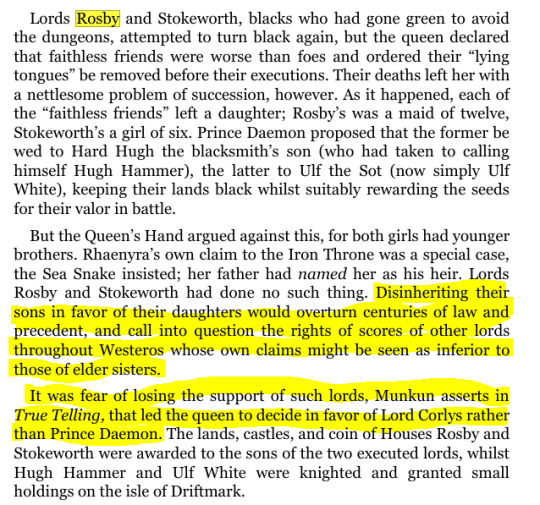
A)
Account of the greens taking Rosby and Stokeworth and the two lords swearing fealty to them "under duress" (as OP says):
With a hundred knights and five hundred men-at-arms of the royal household, augmented by three times as many hardened sellswords, Ser Criston marched on Rosby and Stokeworth, whose lords had only recently repented of their allegiance to the queen, commanding them to prove their loyalty by adding their power to his own. Thus augmented, Cole’s host advanced upon the walled harbor town of Duskendale, where they took the defenders by surprise. The town was sacked, the ships in the harbor set afire, Lord Darklyn beheaded. His household knights and garrison were given the choice between swearing their swords to King Aegon or sharing their lord’s fate. Most chose the former.
("The Red Dragon and the Gold")
The OP's words:
i don't think rhaenyra was politically pressured into one answer or another. these two decisions wouldn't have really set a precedent for any of her other leal lords, because they specifically involved lords who had committed treason in front of tons of witnesses. the precedent would have only granted rhaenyra the power to choose a lord's heir after he'd been executed for treason and wouldn't have applied to any of her then allies, so making a woman heir shouldn't have made any of her lords feel threatened.
Yeah, well, it shouldn't have... and yet:
Lords Rosby and Stokeworth, blacks who had gone green to avoid the dungeons, attempted to turn black again, but the queen declared that faithless friends were worse than foes and ordered their “lying tongues” be removed before their executions. Their deaths left her with a nettlesome problem of succession, however. As it happened, each of the “faithless friends” left a daughter; Rosby’s was a maid of twelve, Stokeworth’s a girl of six. Prince Daemon proposed that the former be wed to Hard Hugh the blacksmith’s son (who had taken to calling himself Hugh Hammer), the latter to Ulf the Sot (now simply Ulf White), keeping their lands black whilst suitably rewarding the seeds for their valor in battle.
But the Queen’s Hand argued against this, for both girls had younger brothers. Rhaenyra’s own claim to the Iron Throne was a special case, the Sea Snake insisted; her father had named her as his heir. Lords Rosby and Stokeworth had done no such thing. Disinheriting their sons in favor of their daughters would overturn centuries of law and precedent, and call into question the rights of scores of other lords throughout Westeros whose own claims might be seen as inferior to those of elder sisters.
It was fear of losing the support of such lords, Munkun asserts in True Telling, that led the queen to decide in favor of Lord Corlys rather than Prince Daemon. The lands, castles, and coin of Houses Rosby and Stokeworth were awarded to the sons of the two executed lords, whilst Hugh Hammer and Ulf White were knighted and granted small holdings on the isle of Driftmark.
("Rhaenyra Triumphant")
Even with those fathers being traitors, after their executions, the houses themselves would not be considered "treacherous houses" unless the new lords/ladies also betrayed Rhaenyra.
To say that Rhaenyra making these girls ladies is to ignore how Rhaenyra herself becoming queen of Westeros would not have any sort or level of impact on Westerosi customs of succession. Her choice to make a girl the heir/next lady after her father would have created a stronger basis for other girls and women to inherit their fathers' (eventually maybe mothers') positions because it gives more strength to a girl/woman's claim in other houses regardless of what their fathers did or didn't do. The result would still be a girl/woman growing to be the lady of her house and she would have to take on the privileges, constraints, responsibilities, duties, and final decisions for the rest of her life. no matter the identity of the father, the house itself would live on if Rhaenyra doesn't decide to just eliminate the entire two houses... which she didn't do. Why? Because she is the first female monarch, the rules are already bent a little and she is in that "supreme" place. She can bend the rules more toward her own needs or just support those who themselves present changes that could help her and them. (She doesn't which is disappointing but also idk, I can't blast her after her losses.)
As the monarch, Rhaenyra already has some influence/power over how other houses and lords will and can safely transfer power. Rhaenyra making Corlys' "grandsons"--Alyn and Addam of Hull--his heirs by officially legitimizing them so they could also inherit the name "Velaryon" is her continuing the succession-tradition & performing an already-customary royal privilege of determining succession rights for other lords. This is already a monarch's privilege and right, but it was critical for the Velaryons, and having a girl come before other men around her itself presents the chance for other girls/women to press for the higher seats, be more considered for those seats, and receive less resistance once they get them or have less trouble having support in case of resistance. Every action Rhaenyra takes when it concerns succession absolutely can become precedent or is already customary. The lords around her are looking at how she acts to adapt their own actions to hers, that's part of the game of feudalism in Westeros.
If anything, if those girls had become the ladies and acted in good faith w/Rhaenyra, it would likely have given more credence to both Rhaenyra's image of mercifulness and wisdom and the girls' loyalty to their queen/superior/monarch. Traits of an ideal leader, for both--making feudal patriarchy work for you, or a chance to emphasize that. Aside from that, if Rhaenyra had granted these houses to these girls she could have inspired a more practical loyalty to her that reduced the risk of what happened when she was forced to flee KL--one of these girls turning her away.
Corlys Velaryon--Rhaenyra's principal supporter, her Hand, the guy who's supplying the fleet she's using, the guy who's financing the entire war besides her own Dragonstone funds allocated for the war, and whose later imprisonment caused many of his followers and soldiers to desert her--strongly argued against her giving those girls the castles. He argues such despite their father being traitors (about the refusal to continue lines of succession through girls regardless of past parents' actions) and there being a true and real precedent for girls to inherit when there is absolutely no direct male relative available. Corlys felt threatened--not directly so, but with the concept of universal female leadership. He saw in Rhaenyra the exception, Rhaenyra needed him, and for her to be overall successful--or anyone from a position like her where they are trying to rise through a society that otherwise wouldn't allow her to--there come times where compromises must happen or you can't see anyway out of said situation where you think you must.
And thinking in Rhaenyra or someone in her shoes thinks how he wouldn't be the only one thinking so; if he, someone on her council and in proximity to her, thinks it is it that much of a stretch to contemplate what others would/could/do? Rhaenyra and others would know that some of her own supporters would have felt similarly and this was a moment where she/the blacks would have felt they needed to prevent as many conflicts or defections as possible.
So honestly, no, the ideas that 1) Rhaenyra wasn't under real pressure or 2) that at least some of the supporting lords wouldn't concerned/threatened with a traitor's daughter inheriting despite their dads being traitors is false. The problem decidedly came from a gender thing.
BTW, Rosby's daughter was 12 and Stokeworth's was 16.
To deny so is to deny the evidence of misogyny being the defining feature of the Dance and a deciding motivation behind Rhaenyra's act of appeasing male lords for her own immediate needs/the progress of her self-doubt and paranoia and the decline of her relationships and bonds of trust as if these things weren't a major factor and didn't lead to her writing her execution letter to Nettles/distrusting Daemon.
B)
OP says this:
it's deliberate that the dismissal of the daughter's claim is mentioned in the same sentence where she denies rhaenyra entry. the poetic justice of that is not a coincidence. whether you think this is grrm narratively punishing rhaenyra for not being feminist enough, or whether you think she's being unfairly punished for being constrained by the patriarchy- it's up to you. i'm personally undecided. but regardless of her intent, her decision is very intentionally implicated in her demise."
I agree that there was poetic symmetry--a kind of "justice"--for Rhaenyra disinheriting the girl ending with the same girl denying her sanctuary after Rhaenyra loses her own inheritance--after being put in danger of smallfolk riots and losing her son and dragons. Another son and heir who will not receive her seat or possessions, as those girls did not until she herself lost. If nothing else for the situational irony, but definitely how it also reflects how the Targs have also sacrificed some of its own members for power, namely its female members. Beginning from Aenys I. House Targaryen hurting itself under the constant need to survive as a strong house while anticipating attacks from outside.
Her going after Nettles was not only her removing a "love" rival but also her trying to legitimize her own and her kids' claims (in her view). There was enough clear-headedness there, why not the Rosby/Stokeworth? Yes, there was pressure on top of her grief probably messing with her sense of safety versus what and how to get there, but it is a fact that she chose the path of least resistance to throw off the pressure when she didn't need to. (Why was Nettles "more" emotionally troubling more than the two traitors' girls? Already explained this in the Twitter thread I linked.)
Again, at the same time, I can see how misogyny and constant patriarchal disparagement of her in her personal history and her own experiences (not created) fueled her self-preserving mindset into a place where more things pushed her into that paranoia and near-Cersei-need to gain any level of control as soon as possible. There to motivate Rhaenyra as with Cersei Lannister killing Robert's bastard kids and the abuse even against her own and Alicent not caring for the raped girls of Tumbleton/pushing for Aegon to be king for her own power. blankwhiteshield explains in this way:
You can have an irredeemable and evil character that the patriarchy still suppresses and affects the psychology of immensely, rendering her a bigger monster. The commentary on the destructive capacity of static social constructs is not lost as a result. A character can turn into the devil of the story due to a world that ceaselessly strips her of her humanity, as well as as a result of the choices she actively makes.
I think Rhaenyra turned tyrant because she reached the limit sooner than we'd like after her not being able to work through her grief and several betrayals and deaths of loved ones occurring in pretty quick succession. Simultaneously, she:
had, performed, & used misogynoir against Nettles
removed inheritances from other noble girls to ensure other lords surrounding KL's support based on Corlys' advice rather than her own husband who gave better advice
and went after one of the biggest bulwarks of her fight against the greens which her own son organized for such (the dragonseeds) through blood purity to get rid of perceived threats...the same bp which threatened her son and gave justification to the contraction of female sexual a general autonomy
She didn't have her avenues to her goal straight AND the Targ-anal paradigm provided her with the ready blueprint of blood purity, misogynoir.
So OP is right to point that out, that there was poetic "justice" if not plain symmetry. We can't move away from the fact that her actions had consequences against her and inevitably led to not having enough time and room to recuperate to go against Aegon again. Ironic since Dragonstone--the place where she will end up after not having that room-and-board denied to her--was her past base away from Alicent to learn how to rule and to grow her lost family.
Both her fault and not: not hers in the beginning, but hers later--psychologically affected by both grief from direct attacks and classist entitlement.
Check out this post by la-pheacienne, who explains how the narrative identifies Rhaenyra as the wronged party and then the person, affected by those wrongs, then brought her own ends by recalling Greek Tragedy narrative structure.
C) Just for Future Note
OP says this: "when she asks the stokeworths for refuge, the male castellan (ruling in the young boy's stead) tells her she can only stay for one night, and then turns her out onto the streets."
This is the account of Rhaenyra being barred from Rosby's castle after fleeing KL:
The accused turncloak Addam Velaryon, born Addam of Hull, had saved King’s Landing from the queen’s foes…at the cost of his own life. Yet the queen knew nothing of his valor. Rhaenyra’s flight from King’s Landing had been beset with difficulty. At Rosby, she found the castle gates barred at her approach, by the command of the young woman whose claim she had passed over in favor of a younger brother. Young Lord Stokeworth’s castellan granted her hospitality, but only for a night. “They will come for you,” he warned the queen, “and I do not have the power to resist them.” Half of her gold cloaks deserted on the road, and one night her camp was attacked by broken men. Though her knights beat off the attackers, Ser Balon Byrch was felled by an arrow, and Ser Lyonel Bentley, a young knight of the Queensguard, suffered a blow to the head that cracked his helm. He perished raving the following day. The queen pressed on toward Duskendale.
House Darklyn had been amongst Rhaenyra’s strongest supporters, but the cost of that loyalty had been high. Lord Gunthor had lost his life in the queen’s service, as had his uncle Steffon. Duskendale itself had been sacked by Ser Criston Cole. Small wonder then that Lord Gunthor’s widow was less than overjoyed when Her Grace appeared at her gates. Only the intercession of Ser Harrold Darke persuaded Lady Meredyth to allow the queen within her walls at all (the Darkes were distant kin to the Darklyns, and Ser Harrold had once served as a squire to the late Ser Steffon), and only upon the condition that she would not remain for long.
("Rhaenyra Overthrown")
Conclusions
The Rosby and Stokeworth decisions were mistakes made under intense pressure; those also made for her immediate needs for a man funding most of her war and supplying most of her fleet to continue to want to support her. And I'm interested in how OP continues to not provide textual evidence to go over.
*EDIT* (8/21/23):
THIS is a great post by @mononijikayu about medieval queens, female rulers, the history of how women in leadership positions were made and seen as threats to the very structure of social “order”, and contextualizing Rhaenyra thru Empress Matilda. I didn’t even know about Matilda’s husband being comparable to Rhaneyra’s Daemon! PLZ READ!!!!
Excerpt:
just as much, along with these fictitious portrayals, more lies are depicted. these women are considered vixens that cause havoc to men by shifting them into desires and danger. through the written word, we see how women are cast in roles of villains in men’s lives. it is because by their conclusive thoughts, women are the only creatures that are able to turn ‘good honorable men’ into despicable creatures who do shameful, deplorable acts for the sake of women’s pleasures.
[…]
it is within this narrative that ancient chroniclers declare that women were in fact the doom of men. if they were not able to control the dangers posed by the wiles of women, then the foundations of the mighty society they had built would be up in flames.
[...]
as i mentioned, these factors of community are written down and preserved. and with that, the example of the ancients were the foundations by which medieval society built itself. the same concepts continued to cause the same issue within society and that was the exclusion of women from participating in the bigger picture of community and state, much so with governing states in their own right—without judgment or disapproval.
#asoiaf asks to me#rosby and stokeworth#rhaenyra targaryen#fire and blood characters#rhaenyra's characterization#rhaenyra and feminism#asoiaf#fire and blood
8 notes
·
View notes
Note
Let’s give Team Black the best case scenario where they win the war uncontested and there are no betrayals by any dragonseeds- where do you think Nettles would fit in the regime after the war? Ulf & Hugh get to be knights and have holdings while Addam is taken under Corlys’s wing, but Nettles is now a (presumably) non Valyrian lowborn dragonriding female- she’s kind of a conundrum for the powers that be.
Jace’s call to action is gendered- “…vowing that any man who could master a dragon would be granted lands and riches and dubbed a knight. His sons would be ennobled, his daughters wed to lords, and he himself would have the honor of fighting beside the Prince of Dragonstone against the pretender Aegon Il Targaryen and his treasonous supporters.”
Do you think the plan could have been marriage as opposed to knighthood for Nettles? But then that introduces the sticky situation of essentially giving dragons to other noble houses. I thought maybe Alyn (assuming Addam survived in this scenario), but I’m not sure.
(Obvious preface that this is not about That Other Show and anyone using this to talk about That Other Show is getting blocked.)
You ask an interesting question, because Nettles very clearly stood apart from the other non-Targaryen dragonriders in ways that I think would have left her without an obvious place even in a world where the black faction was victorious. Addam of Hull (and, by extension, his dragonless brother Alyn) fit most comfortably in the black faction’s political calculus: as the acknowledged bastardborn “grandsons” (really sons) of the Lord of the Tides, helpfully introduced just after that same Lord Velaryon had lost his designated male heir, Marilda’s sons could follow the same path as so many aristocratic Westerosi bastards before them (including knighthoods, lordships, and aristocratic marriages); moreover, as very evidently Valyrian descendants (with one riding a Velaryon dragon, no less), these boys could be logically accepted as Valyrian-blooded dragonriders. While neither Hugh Hammer nor Ulf the White displayed so open a connection to any such Valyrian heritage, their lifetime residence on Dragonstone and seemingly “natural” bond with their respective dragons (not to mention Ulf’s silvery hair) allowed for a satisfactory narrative which cast them as dragonseeds, ancillary dragonriding scions of House Targaryen akin, if not specifically equivalent, to other royal and aristocratic bastards. While it doesn’t appear Rhaenyra had specific careers, so to speak, in mind for either Hugh or Ulf - both were knighted and given small holdings seemingly only after the Rosby and Stokeworth inheritance dispute - their identification as male dragonseeds could, to some extent, smooth their transition into a level of aristocratic life for them within the black faction.
However, where could Nettles fit in this socio-political universe? Nettles’ scheme to ride Sheepstealer did not simply demonstrate her cleverness (though it certainly did) - it also provided Nettles with a unique, indeed perhaps revolutionary, path to personal power. Rejecting Jacaerys’ proud declaration that “only Targaryens ride dragons” (emphasis in the original), Nettles, by her shrewd tactics, argued that one did not necessarily have to be a Valyrian descendant to be a dragonrider. The singular Targaryen mastery of dragons, which constituted the source of their dominance during the Conquest, the cornerstone of their diplomacy afterward, and the foundation of their religious Exceptionalism, now potentially lost its potency; if anyone could ride a dragon, why should the Targaryens rest at the top of the feudal hierarchy? The black faction, in any post-victory scenario, would need to grapple with the presence of a woman whose very existence as the sort of dragonrider she was opposed the Targaryen royal narrative, even if she herself was no rebel against the black faction or the Targaryen political system.
Furthermore, Nettles would still be subject to a variety of prejudices even in a post-victory world for the black faction. Sexist Gyldayn’s disgusting and typically derogatory commentary aside, Nettles certainly came from what Westerosi (and specifically blue-blooded Westerosi) would consider a rather unsavory background: “a bastard of uncertain birth”, potentially “the daughter of a dockside whore”, “foul-mouthed” and apparently considered ugly by Westerosi standards (at least in the opinion of the openly pro-green Septon Eustace, who in all likelihood never actually saw her). Hugh and Ulf might have been just as lowborn, to be sure - Hugh is identified as a “blacksmith’s bastard”, while Ulf is described as a man-at-arms, in other words a low-ranking soldier - but since Westerosi patriarchy is gonna patriarchy, these men could pursue careers and have levels of social standing that Nettles, simply by virtue of her gender, never could; consequently, these men could also be moved up the social ladder, to at least a limited extent, with some ease where Nettles, by contrast, could not. Even if Nettles never actually worked as a sex worker (again, Gyldayn can fuck off with any such notion), the surface-level associations would always be there, certainly in the eyes of those already prone to look down on Nettles - she was the (presumed) daughter of a whore, living alone on the streets without any obvious trade or skills, so of course she was no more than a whore herself, or at least so onlookers would assume. In a world where even aristocratic women born to power and privilege have a harder time than their male counterparts in asserting their rights and claims to authority, how could the orphaned, lowborn girl Nettles be left to enjoy the sort of independent power she had as not just a dragonrider, but as what we might call a self-made dragonrider?
Too, because Nettles was a person of color, she was that much more easily othered by Westerosi society. Rhaenyra might have been the most blatant in using Nettles’ appearance (which is to say, her race) to undermine her, Nettles’, accomplishments - calling her a “a low creature” and declaring that “[y]ou need only look at her to know she has no drop of dragon’s blood in her” - but Mushroom, Munkun, and indeed Gyldayn all define Nettles first by her race, in a way they very obviously do not for the non-POC characters. With the racial xenophobia and prejudice which can permeate Westerosi society - see, for example, the dismissal of the current generation of Westerlings for the “doubtful blood” inherited from their Essosi great-grandmother, or the exotification of the Myrish Taena Merryweather, or the long history of antagonism against the people of Dorne from their non-Dornish Westerosi neighbors - Nettles might have found herself very much alone even among a triumphant black faction. Would she too be seen as a lesser dynastic prize, or ineligible for holdings in her own right, by virtue of her race, someone excluded from the upper echelon of Westerosi power politics because of the color of her skin and the foreign ancestry it represented?
So I could see where, even in a victory scenario, Nettles may not have found herself totally or indeed at all welcome among the black faction. Nettles was a young woman who challenged the expectations of Targaryen draconic power, and who did so despite her race, sex, and class all assigning her an otherwise likely permanently low-ranking position in Westerosi society. Sadly, Nettles’ actual choice at the end of the Dance IOTL demonstrates the limited options she faced even as someone ostensibly so powerful as a dragonrider; her best case scenario in a post-Dance world was to live in permanent exile from the only home she had ever known, among people who were completely alien to her in custom, religion, and background, left to be isolated, worshiped, and feared as a local god.
62 notes
·
View notes
Text
Of Dragons and Maelstroms


Themes and Warnings: slow burn, enemies to lovers, blood, violence, explicit language, sexual violence, period-typical misogyny, sexual themes, smut, tension, marriage, jealousy, pregnancy, childbirth, miscarriage, attempted sexual assault, breastfeeding, major character death, divergent timelines
Disclaimer: I do not own any of the House of The Dragon/Fire & Blood/Game of Thrones characters nor do I claim to own them. I do not own any of the images used nor do I claim to own them.

Chapter Seventy-One
“I have to go. It is the Kings command.”
After a day and night filled with arguing regarding not only Aegon’s disrespect, but of what he had asked Aemond to do, Maera’s awoke the following day opting for silence, the flames of her anger burning brighter than ever before. Her husband was returning to his whore. And despite his reassurances that he would not lie with her, nor even be in the same room with her unless absolutely necessary, Maera found little comfort in his words.
War finally felt as though it was at her doorstep. News had reached them that the Lord Commander continued to make his way across the Crownlands, experiencing a few delays on the way to Duskendale due to rebels in the villages of Rosby and Stokeworth, led by wayward knights and angered common folk. These traitors were quickly put to the sword and the Green forces had remained a few days in each location to ensure stability, before moving onto present terms to House Darklyn.
“Are you just going to keep ignoring me?”
The quill scratched furiously across the parchment as Maera penned urgent letters to her siblings, Luthor and Sabine. She implored them to provide sanctuary for her niece and nephew, no, her husband’s niece and nephew, detailing the escalating dangers in King's Landing and the need to keep the children safe.
Meanwhile, a few servants bustled about the room, packing Aemond's belongings into sturdy chests. Each item carefully folded and arranged, ready to be transported to Harrenhal. Aemond's presence loomed in the chamber as he prepared to depart, donning a long leather overcoat suited for dragon flight. Despite his outward appearance of composure, an undercurrent of agitation simmered beneath the surface, fueled by Maera's persistent silence towards him.
She signed her name on the letters to her siblings with a firm hand, the ink drying quickly on the parchment. With practiced precision, she folded each letter closed and sealed them shut with crimson wax, pressing the royal seal of House Targaryen onto the surface.
Despite the urgency of her task, Maera couldn’t shake the feeling of Aemond’s presence lingering in the room. She could sense his eye on her, but she refused to meet his gaze, her focus solely on completing the task of securing the safety of Jaehaera and Maelor.
As she stood from the desk, her movements deliberate yet tinged with apprehension, Maera found herself face to face with Aemond, who had cornered her. His imposing figure seemed to fill the space between them, his eye searching hers for some sign of reconciliation. But Maera remained steadfast, her resolve unyielding despite the tumult of emotions swirling within her. Aemond’s gaze bore down on Maera with an intensity that seemed to penetrate her very soul, his single violet eye flickering with emotion. Initially, Maera averted her gaze, her green eyes skirting away from the raw intensity of his stare.
“I do not know when I will return,” he murmured with a furrowed brow. A sense of defiance ignited within Maera, and she raised her chin, meeting his gaze head-on, her jaw set in determination as the Prince continued to speak. “But I do not wish to part ways like this.”
When Aemond reached for her hand, Maera’s heart fluttered with a mixture of apprehension and longing. She hesitated for a moment, her hand trembling slightly before she tentatively allowed him to intertwine their fingers. Their hands formed a silent connection, a fragile bridge between the chasm that had grown between them. Aemond knew her better than most, and no amount of kind words of thoughtful gestures in this moment would change the way she felt.
With his other hand, Aemond gently lifted Maera’s chin, tilting her head upward until their eyes locked once more. “Do not cause trouble whilst I am gone,” he ordered with a slight smile. Maera’s breath caught in her throat as she felt the weight of his parting words, the warmth of his hand against her skin burning like fire.
He lowered his head down slightly, capturing her attention. “Remain here and focus on the safety of our child. Do not over exert yourself,” Aemond commanded, his tone firmer and face serious, leaving no room for disobedience.
Aemond released her hand, allowing it to rest gently on her growing stomach, a silent acknowledgment of the life burgeoning within her. Maera felt a surge of tenderness wash over her at the touch, the weight of their unborn child pressing against her palm. Their child would be born in five, maybe four, moons, and she couldn’t help but wonder if Aemond would return in time for the birth, if fate would allow him to return at all. Blinking back the tears that threatened to spill, she forced herself to push aside the anxious thoughts that crowded her mind, focusing instead on the present moment.
His other hand, which had been cradling her chin, now moved to the back of her head, drawing her close. Maera leaned into his touch, her heart skipping a beat as his lips brushed against her forehead, his sharp nose buried in her hair. In that fleeting moment, she breathed him in, the scent of dragon smoke and leather imprinting itself upon her senses forevermore.
“Avy jorrāelan,” I love you, he whispered against her skin, his words uttered like a prayer. Maera felt the tug of desire warring against the walls of her resolve. She longed to surrender to him, to relinquish herself to the undeniable pull of their connection. Yet beneath the surface, a stubborn determination held her back, a fear of vulnerability that she couldn't quite shake.
As Aemond pulled away, his gaze lingering on her form, Maera watched him leave silently, her heart heavy with unspoken words as he departed through their chamber doors. She listened to the echo of his footsteps fade into the distance, leaving her alone with her thoughts as she made her way to the nearby window, sitting and gazing out at the world. After a while, Maera saw the unmistakable silhouette of Vhagar soaring through the sky and disappearing into the clouds, leaving her feeling utterly powerless.
Anger simmered beneath the surface, fueled by the frustration of the ongoing war and the relentless chaos it brought. She clenched her fists, a silent protest against the forces that tore them apart. The pang of his departure cut deep, leaving her feeling abandoned and alone in the midst of the tumultuous political landscape. The thought of Aemond's possible interactions with Alys gnawed at her, igniting a bitterness that she struggled to suppress. The war had already taken so much from them, and the fear of losing him to another woman added another layer of anguish to her already burdened heart.
Staring at horizon, her hand instinctively going to her growing belly, Maera couldn't shake the feeling of vulnerability that enveloped her. The weight of her impending motherhood added to her sense of isolation, leaving her feeling exposed and defenseless in a world fraught with danger. Maera’s keen ears could detect the low rumbles of Ēbrion’s calls on the beach, the noise filled with longing and pain. With a heavy sigh, she allowed her tears to flow freely, a silent testament to the weight of their parting and the uncertainty that lay ahead.
Maera made a conscious decision to shift her focus away from her turbulent emotions and instead spent time with Jaehaera and Maelor in the serene surroundings of the Red Keep gardens. As they strolled amidst the vibrant foliage, escorted by Ser Arryk, the laughter of the children and the gentle breeze from the nearby sea served as a welcome distraction, momentarily drowning out the storm of frustration that brewed inside her.
The trees, adorned with leaves of crimson, gold, and amber, rustled softly in the breeze, releasing a symphony of whispers that echoed through the air. A carpet of fallen leaves decorated the ground, crunching softly underfoot as they walked along the winding pathways. The fragrance of earth and decaying foliage mingled with the sweet scent of late-blooming flowers, creating an intoxicating aroma that hung in the air.
Being surrounded by the beauty of nature provided Maera with a temporary reprieve from the harsh realities of her situation. As she watched Jaehaera and Maelor play amidst the splendor of the gardens alongside her protector and a nursery maid, she found solace in the simple joys of the moment, allowing herself to momentarily forget the pain of Aemond's absence and the sense of powerlessness that weighed heavily upon her. In this tranquility, she could lock away her feelings and find comfort in the comforting embrace of denial, if only for a fleeting moment.
“It is hard to believe you were once that small.”
Maera turned to unexpectedly see her father, Lord Jasper, approaching on the stone path. No doubt he had heard of her and her husband’s disagreements before his departure, and was checking to see if all was well. The Master of Laws cut a distinguished figure in his classic attire of turquoise and gold, his chest adorned with a chain that gleamed in the sunlight. Lord Jasper carried a stack of books and scrolls, a testament to his scholarly pursuits.
Despite the presence of her father, Maera maintained her silence, offering him only a brief nod of acknowledgment before returning her gaze to her wards. Lord Jasper joined her side, his gaze also fixed on Jaehaera and Maelor as they played together in the garden. Lord Jasper breathed a laugh as he watched the nursery maid scolding Maelor for tugging his sister’s hair, a scene that brought a fond smile to his lips.
“Laethan and Vaeron always pulled on your braids,” the Master of Laws chuckled at the memory of his late sons, but was met with silence from his daughter. In truth, she could not remember those moments with her brothers, or even what they truly looked like. She knew one had silver hair like their mother, the other dark brown like Maera, but that was all. Another torn page in her book of family history.
Sensing he was getting nowhere, Lord Jasper opted for a different approach. “Your stepmother writes that she is with child again.” This earned more of a reaction, a mere scoff from Maera. This would bring the total of trueborn children up to thirty. More pieces on her father’s political chessboard. A Wylde on the seat of every great House, if he so wished. The news of another sibling brought no comfort. Maera wondered if she would actually even get to meet them now she was a Princess and lived in Kings Landing. Probably not, as her place was in the Keep, with her husband. Her husband who was now gone.
The Master of Laws sighed deeply, turning to his daughter as she met his gaze with a furrowed brow, her eyes the same shade of green as his. “I know this is difficult Maera, but such is the ways of war,” he began. “Your husband will serve the Realm justly at the warfront, and you will serve the Realm here, by providing the Prince with an heir.” Her father’s gaze wandered down to her growing stomach, protruding out of her black and gold skirts.
“An heir that could perhaps also inherit the throne. Stranger things have happened,” Lord Jasper grinned. Maera tore his gaze away from him, instead refocusing on Jaehaera and Maelor playing. Would it be so difficult just to love the child in her belly as it was? And not have it be a contender for the throne? Why was the child viewed as its station rather than the person they actually were? Was a parent’s love truly so conditional?
A hand on her shoulder brought Maera back to reality, causing her to look again at the Master of Laws. He shifted uncomfortably for a moment, almost hesitant for the words to leave his mouth.
“You are his wife. Nothing, and no one can take that away from us,” Lord Jasper stated. Maera shook her head subtly to herself. Of course. ‘Us.’ Naturally, her father cared for little else except their statuses as nobles. Now Aemond and Maera were bound in marriage, nothing a bastard whore presented to her husband could tear him away from Maera by law. But she did not care about law.
“I understand what he has done may have upset you. But it is the way things are, and you need to accept that.”
As her father continued to speak, Maera’s frustration and anger threatened to boil over, evident in the tensing of her muscles and the tightness of her jaw. Despite Lord Jasper’s advice conforming to societal expectations, Maera’s body grew increasingly rigid and defiant, her shoulders squared and her gaze steely.
“It is your duty to stand by his side and endure, no matter what happens,” the Master of Laws concluded in a firm tone, ordering his daughter to simply accept the current reality and be a good obedient little wife, like so many noblewomen before her. Unable to contain her emotions any longer, Maera’s anger erupted like a raging inferno.
“Fuck that.”
With a sharp turn, she stormed away from her father, her steps purposeful and determined. Approaching Jaehaera and Maelor, she enveloped them in firm kisses on the crowns of their heads, the scent of soap mingling with the silver locks of their hair, a brief moment of solace amidst the turmoil. Leaving the children in the care of the nursery maid, Maera began to stride back towards the castle, her jaw clenched with resolve. Despite Lord Jasper’s attempts to call her back, she ignored him, her mind consumed by the task at hand.
As she made her way, Ser Arryk, ever loyal, jogged to catch up with her. The clink of his armor grew louder until he reached her side, his mousey brown hair tied back and his neatly trimmed beard framing concern in his hazel eyes. With a steady gaze, he wordlessly offered his support, ready to stand by her side through whatever challenges lay ahead.
The servants bustled in and out of Maera's room for the second time that day, their hurried movements filling the space as they packed her belongings into chests. Black and gold dresses of various styles and fabrics were carefully folded and placed alongside her leathers and weapons, ensuring everything was packed securely for the journey ahead. A smaller chest was prepared, containing essentials that would tide Maera over until the rest of her belongings could be delivered on horseback in a weeks' time.
Meanwhile, Maera sat at her dresser, clad in her black and gold riding leathers, as her loyal maid Thena worked on braiding her hair. With expert fingers, Thena expertly wove Maera's dark locks into neat plaits, the silver streak standing out prominently against the darker strands. As the first braid was completed, Thena moved on to the second, her brow furrowed with concern as she worked.
"I know you don't approve, Thena" Maera stated matter-of-factly, her voice tinged with defiance.
Thena continued her task, her hands weaving through Maera's hair, her expression softening with worry. "I'm just worried for you, Princess, and for the babe," she replied gently, her voice laden with concern. "War is dangerous, and it spares no one."
Once the braiding was finished, Maera rose from her seat and turned to face Thena, taking the maid's hands in her own. Gratitude shone in her eyes as she gazed at the older woman, her ginger hair framing kind brown eyes that reflected genuine care and concern.
"You have been loyal to me since the day I returned to King's Landing," she acknowledged, gratitude evident in her tone. “And I will never be able to repay all the kindness you have shown me. But I hope this helps a little bit.”
Reaching into the drawer of her dresser, Maera procured a black silk purse, containing enough silver stags to start a new life, and pressed it into Thena's hands. "I know not when or if I will see you again," Maera admitted, her voice tinged with uncertainty. "But I need one more favor from you."
Thena's eyes were filled with tears, and her smile was warm and reassuring as she listened attentively. "Anything," she promised.
Maera's gaze held steady as she spoke her next words with conviction. "Prepare the children to leave the capital when the time is right," she instructed, her tone firm yet earnest. "And if possible, against the King's wishes, try to get Helaena out of King's Landing too."
Thena nodded solemnly, her agreement a silent vow to carry out Maera's wishes, no matter the obstacles that lay ahead. As Maera bid farewell to her loyal maid, the air in the room seemed heavy with the weight of their parting. Their embrace was not a formality, but a genuine display of affection and gratitude, their intertwined arms speaking volumes about the bond they shared. Tears welled in Maera’s eyes as she held onto Thena, the maid’s comforting presence offering a moment of respite.
When the chamber doors creaked open, Maera reluctantly pulled away from Thena, her gaze shifting to Ser Arryk as he entered. He stood there, a stalwart figure, his presence a source of reassurance amidst the uncertainty of their circumstances. Clad in a cloak and without his usual armor, his sword still hung at his hip as a silent reminder of his duty.
Maera wiped her eye before addressing her protector. “Oh Arryk, I have not forgotten about you either.” With a soft sniffle, Maera opened the dresser again and retrieved another purse of silver, intending to offer it to Ser Arryk as a token of gratitude for his steadfast service. However, to her surprise, he shook his head, declining the gesture with a solemn expression. “I made a vow, Princess, and I shan’t abandon it now. You will not journey into the vipers nest alone.”
As Maera processed the news that Ser Arryk would be accompanying her to her destination, a wave of relief washed over her. The prospect of facing the unknown ahead seemed less daunting now, knowing that she would have his steadfast presence by her side. In that moment, she felt a profound sense of gratitude for the unwavering support of both Thena and Ser Arryk, their loyalty serving as a beacon of strength amidst the turmoil of their circumstances.
Maera walked through the corridors of the Red Keep, her steps echoed with a newfound determination. Ser Arryk's presence at her side offered a sense of reassurance, a reminder that she was not embarking on this journey alone. Though he had declined to accompany her on dragonback, knowing that he would meet her at her destination in a week's time provided a comforting anchor amidst the uncertainty that lay ahead.
As she traversed the familiar halls, Maera's mind buzzed with a whirlwind of thoughts and emotions, reflecting on the tumultuous events that had led her to this pivotal moment. Less than a year had passed since she had returned to the capital, yet the landscape of her life had been irrevocably altered.
Married to Aemond, the man she had once despised, their relationship evolved from a childhood friendship to a love that defied expectations. The loss of Jaehaerys, the innocent boy she had watched come into the world, weighed heavily on her heart, a stark reminder of the fragility of life in a world plagued by violence and betrayal.
And then there was Helaena, the fragile thread that had initially drawn Maera back to the capital. Seeing her friend suffer through unimaginable grief and loss had been a horrendous experience, one that had left Maera grappling with her own sense of helplessness in the face of such profound suffering.
But amidst the darkness and despair, there was also hope. With the weight of her husband's child nestled within her, Maera embarked on a journey to mount her dragon, Ēbrion, a creature with whom she had formed an improbable bond against all odds. With Ser Arryk opening the doors to the courtyard, Maera found herself drawing strength from the resilience that had carried her through the trials of the past year, determined to seize control and forge a path forward, no matter the obstacles that stood in her way.
“Maera!”
Turning, she saw the Queen Mother rushing down the stairs, green skirts flapping as she ran, her face flushed with exertion. This was no doubt one last act of the Master of Laws, using Alicent, who had greater authority, to get Maera to fall in line.
“Maera, please,” Alicent implored, reaching out and clasping onto Maera’s arms with desperation. Maera’s expression softened as she regarded her mother-in-law, noting the anguish etched on her face. “You cannot leave. Think of the child within you,” Alicent pleaded.
Maera gently took Alicent’s hand in hers, meeting her gaze with resolve. “It is because of my child that I must leave,” she replied, her voice steady. “Kings Landing is vulnerable. We cannot receive trade via the Gullet. The Realm is divided, and now the Riverlands are lost. My dragon can be better utilized for the war effort.”
As Maera attempted to withdraw, Alicent’s grip tightened, her tone growing more desperate. “Have you even considered your wards, or Helaena?” she demanded.
Maera’s eyes flashed with irritation. “I have ensured the children’s safety,” she retorted. “And as for Helaena, I’ve requested her relocation, but the King refused. If you’re unhappy, take it up with your son.”
With a frustrated sigh, Maera pulled her arm away, her frustration palpable. “I never asked to be thrust into the forefront of a war,” she stated firmly. “But now that I am, I will not stand by idly and watch it unfold before me.” With that, Maera turned on her heel and strode away, leaving Alicent to ponder her words in the echoing halls of the Red Keep.
Mounting her dragon on the beach, Maera prayed to the Seven that what she had learned the past month from the dragon keepers was enough to prepare her for what lay ahead. With a commanding voice, she issued the order for Ēbrion to fly. The magnificent beast responded with a powerful flap of his wings, propelling them into the air with a deafening roar. As they soared higher and higher, Maera took a moment to familiarize herself with the intricacies of the saddle, adjusting the reins to steer the dragon north west, in the direction of her destination.
Though the sensation of flying was exhilarating, she remained focused, her mind sharp as she navigated the skies. With each adjustment, she could feel the dragon responding beneath her, his movements synchronized with her commands and pulling of the reins, ascending into the gray clouds that hung ominously overhead.
After a while of soaring through the calm skies, a sudden shift in the atmosphere signaled the onset of a fierce storm. Dark clouds rolled in with alarming speed, obscuring the once clear horizon with a blanket of ominous gray. Thunder rumbled in the distance, reverberating through the air like the roar of an angry beast. Lightning streaked across the sky, illuminating the clouds with jagged bolts of electric energy. The wind howled with relentless fury, buffeting Ēbrion's massive wings as he struggled to maintain his course amidst the tempest.
Rain began to fall in torrents, pelting down upon Maera with merciless force. Each droplet felt like a sharp needle against her skin, stinging her face and obscuring her vision. She gasped for breath amidst the deluge, the relentless onslaught of water making it difficult to draw in air. Struggling to maintain her grip on the reins, Maera clung desperately to the saddle, her fingers white-knuckled with exertion. With Ēbrion's movements growing increasingly erratic in the storm, she knew she needed to find shelter from the raging elements.
“Dokimarvose, Ēbrion. Pālēs,” Focus, Ēbrion. Evasive Manoeuvres, Maera commanded through the storm, her mount obeying with a mighty roar.
Pushing herself forward into a lying position against the saddle, Maera sought to shield herself from the brunt of the rain. Despite her efforts, the rain continued to assault her with unyielding ferocity, soaking her to the bone and chilling her to the core. As the storm raged on around her, Maera's thoughts turned to the haunting memory of her recent nightmare, the sensation of drowning in the darkness of the water echoing in her mind.
As the storm finally began to relent, Ēbrion soared into a clearer patch of sky, his powerful wings beating against the remnants of the tempest. Maera, her body drenched and shivering from the ordeal, felt a surge of relief flood through her as she finally managed to catch her breath. Laughing incredulously, she marveled at the sheer resilience of both herself and the magnificent dragon beneath her.
With a shaky hand, Maera reached down to place a gentle palm against her growing stomach, feeling the reassuring presence of her unborn child. “Īlon vēttan ziry,” We made it, she grinned.
Turning her gaze past Ēbrion's head, Maera's eyes widened in awe as she beheld the majestic sight of a distant mountain range rising up on the horizon. The rugged peaks stretched out in a breathtaking panorama, their silhouettes etched against the canvas of the sky. Beneath the dragon's left wing, Maera's gaze fell upon an expansive lake, its dark waters shimmering in the sunlight. Nestled within the embrace of the tranquil waters, an island adorned with lush foliage beckoned invitingly, a verdant oasis amidst the vast expanse of the lake.
Yet it was the sight below his right wing that truly captured Maera's attention. As she peered down, her heart skipped a beat at the sight of ruins, sprawled out like the skeletal remains of a once-grand structure. The massive castle, with its towering walls and imposing towers, stood as a testament to ancient power and ambition. The blackened stone, scorched by dragonfire centuries ago, bore witness to the castle's tragic history. Harrenhall.
“Ninkiot.” Land.
With a resounding thud, Ēbrion descended gracefully onto the ground beside the crumbling ruins of Harrenhal, his massive form causing the earth to tremble beneath his weight. The impact sent a cascade of stones tumbling from the dilapidated walls of the once-mighty fortress. Maera wasted no time in unlacing the intricate bindings that tethered her to the saddle, her nimble fingers deftly working to loosen the restraints. She also unfastened the chest secured behind her, which contained her items of clothing and weapons, heaving it onto the ground with a determined grunt.
Descending from her lofty perch, Maera began to make her way down the makeshift ladder fashioned from sturdy ropes, her movements deliberate and sure. However, before she could reach the ground, Ēbrion extended his massive wing towards her, a silent offer of assistance. Grateful for her dragon companion's aid, Maera accepted the gesture, using the sturdy appendage as a makeshift slide to descend the remaining distance to the ground. As her feet touched the earth below, she cast a fond glance up at Ēbrion, silently thanking him for his steadfast companionship throughout their journey.
“Halt!”
Maera’s gaze snapped towards the fortress gates, where two guards dressed in helmets and chainmail stood, swords raised as they approached her. Although the swords were aimed in her direction, their eyes were instead fixed on the gigantic dragon behind Maera. At the sight of the guards’ aggressive stance, Ēbrion reacted instinctively, his massive form tensing as he assumed a defensive posture. With a deep rumble emanating from his throat, the dragon growled menacingly, his blue and black scales glinting in the sunlight as he bared his formidable teeth.
“Lower your weapons, for Gods’ sake,” Maera sneered at the men, hoping to avert a potentially disastrous clash between man and dragon.
“Then state your business,” one of the guards replied, a quiver in his voice as he looked down the dragon’s throat. As Ēbrion prepared to unleash his fiery breath, Maera sprang into action, standing sideways with one arm raised in an attempt to calm the enraged beast. With her other hand held up in a placating gesture towards the guards, she hoped to diffuse the escalating tension and avoid a confrontation.
“Lay down your arms, you idiots!” A voice boomed from overhead, seemingly coming from one of the turrets above the gate. Maera heard the clink of armour of the approaching source of the voice. A voice she was sure she recognised.
Maera’s eyes narrowed as she focused on the approaching man, squinting to discern his features amidst the sunlight. He stood at a similar height to her, with short strawberry blonde hair, a sprinkling of freckles adorning his cheeks, and a neatly trimmed beard framing his jawline. His armour bore the sigil of a blue and silver seven-pointed star on the chest plate, the sword on his hip commanding attention.
Relief flooded through Maera as she recognized the man as Lord Adrian Tarbeck, her sister Sabine’s husband. With a grateful sigh, Maera turned to Ēbrion and gave him a nod of permission to depart. With a powerful beat of his wings, the dragon took flight, disappearing into the distance as Maera and Lord Adrian began to converse.
“You are a long way from home, my Lord,” Maera greeted her brother-in-law with a smile, who returned the grin with a respectful bow.
“Lord Lannister suggested my forces were best utilised here for the meantime,” Lord Adrian replied. He then turned his attention to the guards, barking an order at them to grab Maera’s chest of belongings before inviting her to follow him inside, with the suggestion of settling her into the previous Lord and Lady’s chamber.
Adrian led Maera through the dilapidated courtyards of Harrenhal, the echoes of their footsteps mingling with the whispers of history that haunted the ancient fortress. Crumbling walls loomed overhead, bearing witness to centuries of strife and upheaval. As they entered the castle itself, Maera followed her brother-in-law's steady stride, her mind racing with thoughts of her purpose here. She explained to Adrian that she had recently corresponded with Sabine, seeking permission to take Maelor under her care as a ward.
Before she could delve further into the matter, however, Maera's attention was drawn to a room along their path. Pausing in her tracks, she looked inside, her gaze scanning the sparse furnishings—a small bed, shelves lined with jars and ointments, and a hearth crackling with warmth. In the dim light of the chamber, Maera's eyes fell upon a figure standing at the hearth, their back turned to her as they stirred a pot bubbling above the flames.
“Princess?” Lord Adrian’s voice called her back to reality, his blue eyes filled with confusion as he watched his sister-in-law stood beside the wooden door.
She looked at him for a moment, before turning her gaze back to the person in the room. “Thank you for leading me this far, good brother. I shall find you shortly.” Before Adrian could reply, Maera entered the room and shut the door behind her, turning her attention back to the figure standing before the hearth, a silhouette against the flickering flames.
“I knew you would come, Princess,” the woman’s voice echoed in the room, her attention still focused on the pot bubbling over the fire.
Maera’s brow furrowed in surprise. “You did?” she questioned, taking a few steps closer.
The woman nodded slowly, her movements deliberate. “Yes, I saw you in the storm cloud. And in this fire I lit to cook my supper,” she replied cryptically, her words sending a shiver down Maera’s spine. “I see much and more, you know.”
Maera felt a chill settle over her as she recognized the voice. It was the seer, the witch, the whore—Alys. Despite her apprehension, she squared her shoulders, steeling herself before addressing the woman.
“You see a lot, yet do not know how to appropriately greet a Princess of House Targaryen?” Maera’s tone was laced with thinly veiled disdain, her eyes narrowing as she observed the witch’s form.
Alys breathed a laugh, the sound echoing in the room as she dropped her spoon into the pot with a clatter. “My apologies, Princess,” she replied, turning to face Maera with a smirk playing on her lips.
As the witch turned, Maera’s heart skipped a beat, and a shiver ran down her spine. The woman’s features were eerily familiar—the dimples that creased her cheeks as she smirked, the lines etched around her eyes, and the mesmerizing cat-like green hue of her irises. It was the same face that had haunted Maera’s nightmares, the face of her reflection. Alys then offered a mocking curtsy, her movements fluid yet filled with a subtle mockery.
Maera’s gaze was drawn downward, her blood running cold and a gasp audibly leaving her mouth. The room held a tense silence, broken only by the crackling of the hearth and the distant echoes of the storm that had battered them earlier. Maera stood frozen, grappling with the unmistakable large bump of pregnancy protruding beneath the fabric of Alys’ dress.
“Fuck.”

Notes: 🎤 drop. Things are about to get super fucking messy 🖤
Tags: @blue-serendipity @abecerra611 @saltedcaramelpretzel @marvelescvpe @manipulatixe @0eessirk8 @watercolorskyy @shesjustanothergeek
Thank you so much for reading! Comments, feedback, likes, and reblogs are greatly appreciated 🖤
#maera wylde#aemond targaryen#aemond x oc#aemond fanfiction#chapters#hotd aemond#hotd fanfic#house targaryen#house wylde#hotd helaena
52 notes
·
View notes
Text
rhaenyra / aegon and female inheritance
Viserys name rhaenyra as his heir, never gave any idea of wanting to change the succession and reiterated her position several times in front of the lords ( “I did not decide to name rhaenyra my heir on a whim, all the lords of the kingdom would do well to remember that” ep.3, “Rhaenyra is my heir. Upon my death my throne and my title will pass to her” ep.5, “my daughter, my heir, your future Queen” ep.5). Viserys’ preference toward rhaenyra at the expense of his children with alicent is visible to all, just think of when he got out of bed in the conditions in which he was only to support rhaenyra’s cause and that of her son. Viserys’ wish for rhaenyra to succeed him was clear to everyone, on the other hand the only thing that aegon has on his side is the testimony of his mother, the only one who, according to her, heard Viserys utter his wish to have Aegon on the throne. Now, based only on the appearance (because here we are not discussing if alicent truly thinks viserys meant that or if she pretended to understand what she wanted) this looks like an usurpation, something illegitimate. Otto himself, alicent’s father, do not believe her. The council does not believe her, they were planning to put Aegon on the throne way before alicent said it showing how less they care for viserys’ wish. They do not argue because the motivation behind aegon's coronation is not important, the important thing is that he will be crown king (and also because after seeing cole kill a lord in cold blood I think few people would dare object in his presence).
This creates two syllogisms: if the wish of the king, who is the supreme authority and has the highest level of power, to have his daughter on the throne has not been respected, what can prevent men from transgressing a lord's succession decisions in favour of a male heir? And if the king was betrayed at his death by the people closest to him such as his family, his hand and his council, how can a subsequent monarch appoint a female heir (if first-born, and if she has proven to be more competent than her brothers) if there is a chance that people trusted to him will betray him? The answers to both questions is to appoint a male heir and to exclude female heirs regardless in order not to create a succession crisis.This is confirmed in the book, in fact it is written that Jeyne Arryn supported rhaenyra not only because they were related and she was a woman, but also because “her own rights may be called into question should rhaenyra be put aside”. After the killing of rhaenyra, Aegon could not name his last child as heir, and it was his wish to remarry in the hope of having sons. Now, we can argue that Rhaenyra would not have been a "feminist queen," although we don’t know what choices she would have made if she hadn’t been at war, but surely her uncontested ascension would set precedents that would in the future help female inheritance.
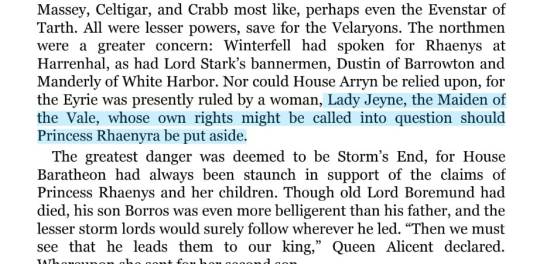
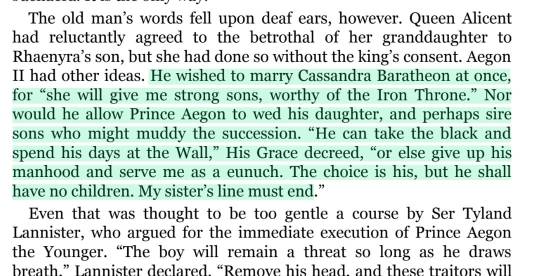
(Before someone mention the situation of lady rosby and lady stokeworth, @dragondream3r made a post that explain the situation perfectly. It can be found here)
#house of the dragon#rhaenyra targaryen#house targaryen#alicent hightower#aegon ii targaryen#jeyne arryn#daemon targaryen#queen rhaenyra#anti alicent stans#anti alicent hightower#anti otto hightower#hotd#fire and blood#asoiaf#a song of ice and fire
47 notes
·
View notes
Text
Playing a little game with the HOTD S2 teaser trailer called "can I identify scenes". Nothing but spoilers (major, major spoilers) under the cut:

Rhaenyra at Storm's End looking for Luke's body, as reported in leaks.

Stokeworth and Rosby shields - this is the Sack of Duskendale / Battle at Rook's Rest. From leaks (re what happens to Meleys, um) we know that BRR is this season, probably near the end of it.
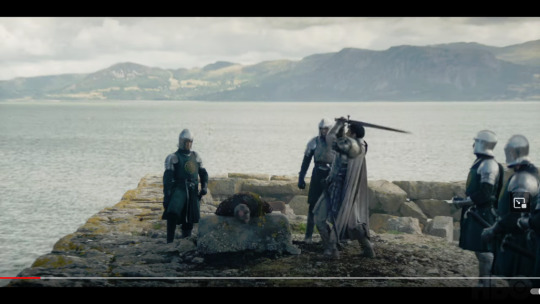
Criston cutting some guy's head off - possibly the execution of Lord Staunton after the battle of Rook's Rest. Staunton's head and Meleys's head were taken to KL and paraded.
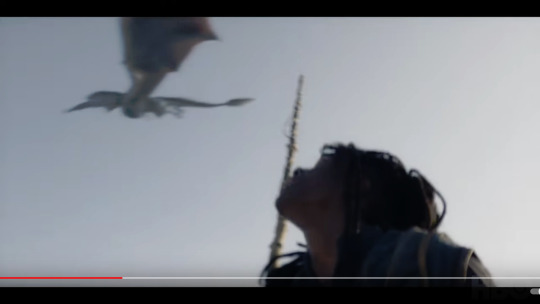
may be Nettles, but I think more likely to be Addam of Hull, as that's Seasmoke.
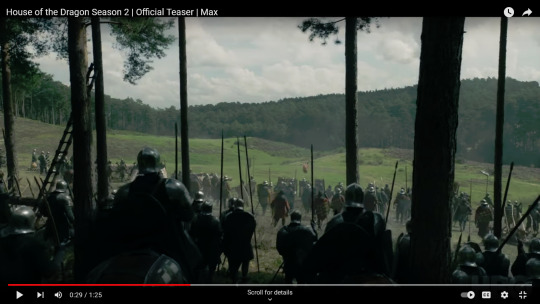
It's a bit blurry, but pretty sure those are Darklyn shields. (<nerd> incorrect Darklyn shields, too many white shields for this point in history, they haven't had that many Darklyns in the Kingsguard yet.</nerd>) More from the Sack of Duskendale/Battle of Rook's Rest.

Possibly executions during Daemon's Assault on Harrenhal? Although that was Aemond who killed the Strongs in F&B... that's definitely a weirwood, though... but then, most castles have weirwoods, not just Harrenhal. Could also be part of the Taking of Stone Hedge.
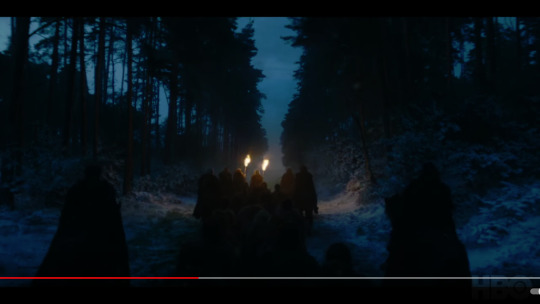
Something in the North, almost certainly, but not sure what. Maybe the Winter Wolves leaving?

Seasmoke's back, back again. Rumors are that Laenor just gives him up or something? Lore nerds will freak ("a dragon never has two living riders!"), but babes, this is where you have to just relax and remember the show is not the books.

Nice establishing shot of the Dragonpit. The Storming will not be this season, but it'll be useful to compare once the show gets there.

This is either Prince Jaehaerys' funeral or the parade after Rook's Rest, but I think that's the carriage that was carrying Alicent and Helaena in mourning clothes (as seen in leaks), so possibly the former. OTOH leaks had a drum being beaten while Meleys's head was paraded, so it might be the latter. We'll see I guess!

Probably at Rook's Rest, trying to get the fuck away from Meleys's fire.

speaking of which. Rosby shields on the ground, that early scene where they were standing is probably right before Rhaenys and Meleys arrived.
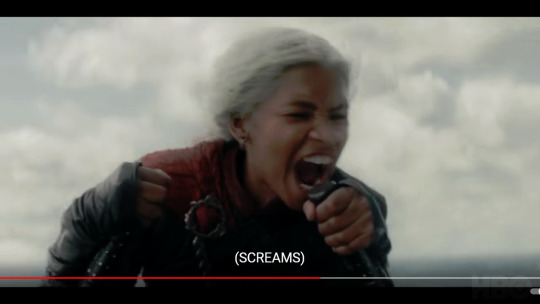
yay Baela gets to do something. Wonder if she arrives at BRR too late to help, but in time to see Rhaenys's body? Would be a good setup for her and Aegon later.

KG doing the Secret Service thing with Alicent. Some kind of public panic, this may be in relation to the Meleys parade because the book says it made everyone want to leave KL, so they may have changed that up a bit.
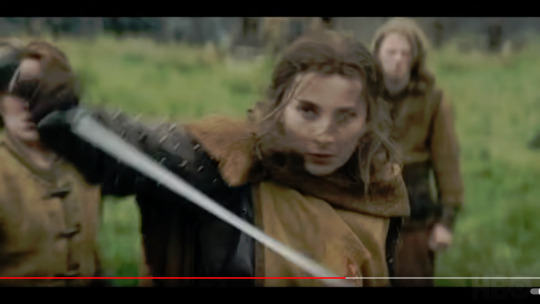
Brackens, probably the Battle of the Burning Mill / Taking of Stone Hedge.
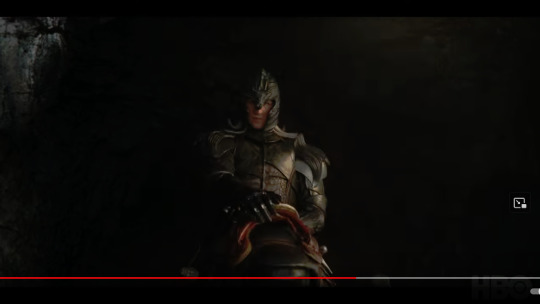
Assault on Harrenhal, probably.

well we all know what this is. 😭

ah shit, Erryk fighting in someone's bedroom? Cargyll twin vs twin, probably, I knew it was early in the war, but I liked him. 😔
Not screencapping this bit, but the cut that makes it look like Aemond is fighting Rhaenyra on their dragons is oh-so-clever to play with audience expectations.
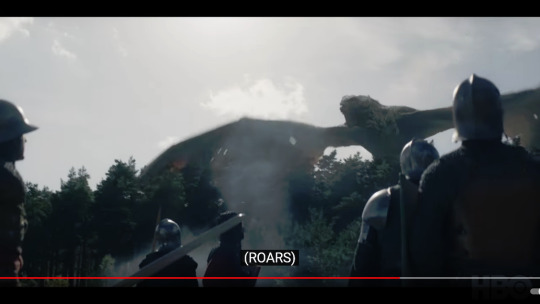
Rook's Rest, the ground is all smoky because of Meleys, and shit here comes Vhagar to make it worse.
A few scenes I have no idea what's happening yet, like the Helaena underwater scene and Alicent in her nightgown at the Gods Eye... are we getting dream scenes at last? Would be a nice changeup. Could be POV prophecies also. Well, looking forward to it!
edit to correct: Helaena's not underwater, that's a veil, undoubtedly a mourning veil. 😭
#house of the dragon#asoiaf#the dance of the dragons#hotd s2#hotd speculation#hotd spoilers#serious serious spoilers - do *not* click if you don't want to know the story!
83 notes
·
View notes
Text
One of the things Rhaenyra antis constantly bring up is the case of the daughters of Lord Rosby and Stokeworth.
Rhaenyra is accused of considering herself the one and only exception, of hating other women, of only wanting herself to rule and wishing for other women to not inherit/rise into power etc.
Except...
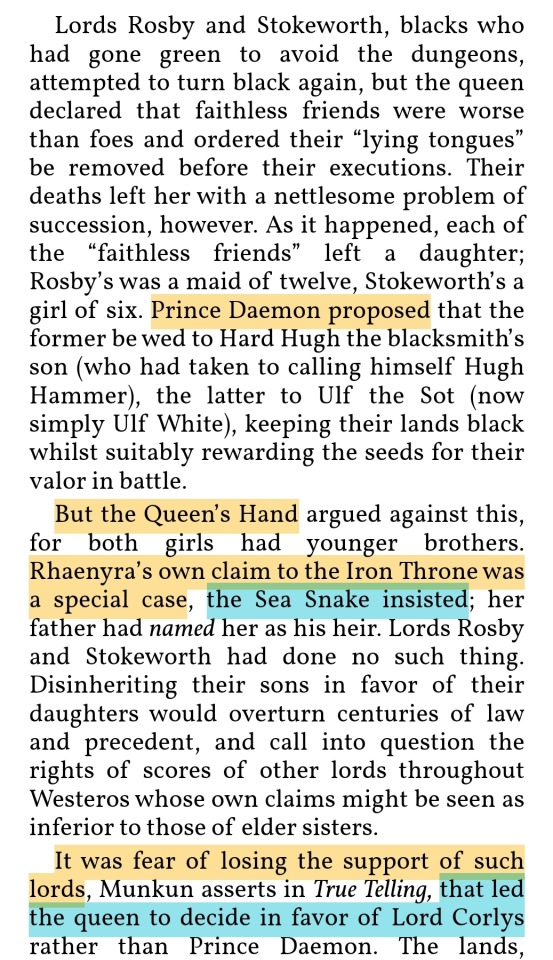
The said "special case" reasoning is used by Corlys, not Rhaenyra. The whole passage, in fact, gives us the thought process of two people, Daemon and Corlys — none of them being Rhaenyra. In fact, it is never stated – not even implied – what Rhaenyra's true opinion on the situation was, or what she believed about it.
Not even when she makes the decision on whose plan to follow, are her thoughts revealed to us in any shape or form. She only chooses Corlys because of "fear of losing the support of such lords", not because she agrees with his arguments, or because she has any internal hatred for women inheriting, or because she considers herself exceptional, or because she wants to be the only woman ruling etc.
These are all headcanons that antis use to paint her as some hateful woman unworthy to rule when, in fact, the canon offers nothing of the sort.
124 notes
·
View notes